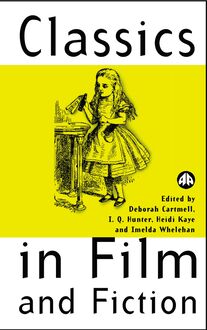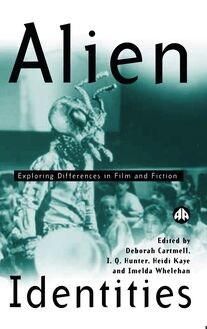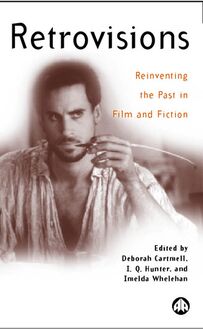-
 Univers
Univers
-
 Ebooks
Ebooks
-
 Livres audio
Livres audio
-
 Presse
Presse
-
 Podcasts
Podcasts
-
 BD
BD
-
 Documents
Documents
-
- Cours
- Révisions
- Ressources pédagogiques
- Sciences de l’éducation
- Manuels scolaires
- Langues
- Travaux de classe
- Annales de BEP
- Etudes supérieures
- Maternelle et primaire
- Fiches de lecture
- Orientation scolaire
- Méthodologie
- Corrigés de devoir
- Annales d’examens et concours
- Annales du bac
- Annales du brevet
- Rapports de stage
La lecture à portée de main
177 pages
English
Découvre YouScribe en t'inscrivant gratuitement
Je m'inscrisDécouvre YouScribe en t'inscrivant gratuitement
Je m'inscris
Obtenez un accès à la bibliothèque pour le consulter en ligne
En savoir plus
En savoir plus
177 pages
English
Obtenez un accès à la bibliothèque pour le consulter en ligne
En savoir plus
En savoir plus

Description
The contributors to Retrovisions consider what happens to history in the movies. Focusing on films and texts from the 1950s to the 1990s, the contributors argue that the past has always come to us by way of previous texts and culturally bounded aesthetic categories, and that history films - to the despair of historians - have always taken a 'postmodern' approach to their subject, seeing the past as a dynamic resource for exciting stories and poetic, morally uplifting untruths. Why do certain decades appeal at certain times? And what does the renewal of interest in narrative history reveal about our culture at the start of the new millennium?
The authors address the variety of ways in which history can be used, refashioned and made over to reflect current concerns - and how history films from the past can be reinterrogated to learn what they tell us about their own times. The films discussed include Elizabeth, Shakespeare in Love, Culloden, The Avengers, Titus, and several adaptations of Les Liaisons Dangereuses, including Cruel Intentions.
Notes on Contributors
1. Introduction: Retrovisions: Historical Make-overs in Film and Literature
Deborah Cartmell and I.Q Hunter
2. 'No Man's Elizabeth': The Virgin Queen in Recent Films
Renée Pigeon
3. Shakespeare in Love and the End(s) of History
Elizabeth Klett
4. Reflections on Sex, Shakespeare and Nostalgia in Trevor Nunn’s Twelfth Night
Maria F. Magro and Mark Douglas
5. Black Rams Tupping White Ewes: Race vs. Gender in the Final Scene of Five Othellos
Pascale Aebischer
6. Cool Intentions: Looking back to the literary classic and other attempts to legitimise the teenpic's 'chick flick'
Sarah Neely
7. Mrs Brown's Mourning and Mr King's Madness: Royal Crisis on Screen
Kara McKechnie
8. Peter Watkins' Culloden and the alternative form in historical filmmaking Nicholas J. Cull
9. The Grandfathers' War Re-Imagining World War I in British Novels and Films of the 1990s
Barbara Korte
10. ‘Charm, Bowler, Umbrella, Leather Boots’: Remaking The Avengers
Stephen Longstaffe
11. Forbidden Planet and the retrospective attribution of intentions
Judith Buchanan
Index
The authors address the variety of ways in which history can be used, refashioned and made over to reflect current concerns - and how history films from the past can be reinterrogated to learn what they tell us about their own times. The films discussed include Elizabeth, Shakespeare in Love, Culloden, The Avengers, Titus, and several adaptations of Les Liaisons Dangereuses, including Cruel Intentions.
Notes on Contributors
1. Introduction: Retrovisions: Historical Make-overs in Film and Literature
Deborah Cartmell and I.Q Hunter
2. 'No Man's Elizabeth': The Virgin Queen in Recent Films
Renée Pigeon
3. Shakespeare in Love and the End(s) of History
Elizabeth Klett
4. Reflections on Sex, Shakespeare and Nostalgia in Trevor Nunn’s Twelfth Night
Maria F. Magro and Mark Douglas
5. Black Rams Tupping White Ewes: Race vs. Gender in the Final Scene of Five Othellos
Pascale Aebischer
6. Cool Intentions: Looking back to the literary classic and other attempts to legitimise the teenpic's 'chick flick'
Sarah Neely
7. Mrs Brown's Mourning and Mr King's Madness: Royal Crisis on Screen
Kara McKechnie
8. Peter Watkins' Culloden and the alternative form in historical filmmaking Nicholas J. Cull
9. The Grandfathers' War Re-Imagining World War I in British Novels and Films of the 1990s
Barbara Korte
10. ‘Charm, Bowler, Umbrella, Leather Boots’: Remaking The Avengers
Stephen Longstaffe
11. Forbidden Planet and the retrospective attribution of intentions
Judith Buchanan
Index
Sujets
Informations
| Publié par | Pluto Press |
| Date de parution | 20 septembre 2001 |
| Nombre de lectures | 1 |
| EAN13 | 9781849645058 |
| Langue | English |
| Poids de l'ouvrage | 1 Mo |
Informations légales : prix de location à la page 0,6250€. Cette information est donnée uniquement à titre indicatif conformément à la législation en vigueur.
Extrait
Film/Fictionvolume 6
Retrovisions
Reinventing the Past in Film and Fiction
Edited by Deborah Cartmell, I.Q. Hunter, and Imelda Whelehan
P Pluto Press LONDON • STERLING, VIRGINIA
First published 2001 by Pluto Press 345 Archway Road, London N6 5AA and 22883 Quicksilver Drive, Sterling, VA 20166–2012, USA
www.plutobooks.com
Copyright © Deborah Cartmell, I.Q. Hunter and Imelda Whelehan 2001
The right of the individual contributors to be identified as the authors of this work has been asserted by them in accordance with the Copyright, Designs and Patents Act 1988.
British Library Cataloguing in Publication Data A catalogue record for this book is available from the British Library
ISBN 0 7453 1583 6 hbk ISBN 0 7453 1578 X pbk
Library of Congress Cataloging in Publication Data applied for
Disclaimer: Some images in the original version of this book are not available for inclusion in the eBook.
Designed and produced for Pluto Press by Chase Publishing Services, Fortescue, Sidmouth, EX10 9QG Typeset from disk by Stanford DTP Services, Northampton Printed in the European Union by TJ International, England
Contents
Notes on Contributors
1.Introduction: Retrovisions: Historical Makeovers in Film and Literature Deborah Cartmell and I.Q. Hunter
2.‘No Man’s Elizabeth’: The Virgin Queen in Recent Films Renée Pigeon
3.Shakespeare in Loveand the End(s) of History Elizabeth Klett
4.Reflections on Sex, Shakespeare and Nostalgia in Trevor Nunn’sTwelfth Night Maria F. Magro and Mark Douglas
5.Black Rams Tupping White Ewes: Race vs. Gender in the Final Scene of SixOthellos Pascale Aebischer
6.Cool Intentions: The Literary Classic, the Teenpic and the ‘Chick Flick’ Sarah Neely
7.Peter Watkins’sCullodenand the Alternative Form in Historical Filmmaking Nicholas J. Cull
8.Mrs Brown’s Mourning and Mr King’s Madness: Royal Crisis on Screen Kara McKechnie
vii
1
8
25
41
59
74
87
102
vi
9.
10.
11.
Retrovisions
The Grandfathers’ War: Re-imagining World War I in British Novels and Films of the 1990s Barbara Korte
‘Charm, Bowler, Umbrella, Leather Boots’: RemakingThe Avengers Stephen Longstaffe
Forbidden Planetand the Retrospective Attribution of Intentions Judith Buchanan
Index
120
135
148
163
Notes on Contributors
Pascale Aebischeris a Research Fellow in English at Darwin College, Cambridge. She has published on Shakespeare and performance theory and is currently working on a book on violence and suffering in Shakespeare’s tragedies.
Judith Buchananis film lecturer in the English Department at the University of York. She works on both Shakespeare and the cinema, separately and in combination. She has written on a number of Shake-spearean cinematic adaptations (including the 1899 Beerbohm TreeKing John, Michael Powell’s unmadeTempest, Oliver Parker’sOthelloand Peter Greenaway’sProspero’s Books), and wrote the introductions to three of the Wordsworth Classics composite volumes of Shakespeare’s plays: the comedies, classical plays and late plays. Her bookShakespeare on Filmis forthcoming from Longman in 2002. She also has a book in preparation on Shakespeare on silent film.
Deborah Cartmellis Principal Lecturer in English at De Montfort University. She is co-editor of the Film/Fiction series, co-editor ofAdaptations from Text to Screen, Screen to Text(Routledge, 1999),Talking Shakespeare (Palgrave, 2001) and author ofInterpreting Shakespeare on Screen(Macmillan, 2000).
Nicholas J. Cullis Professor in American Studies at the University of Leicester, England. He was educated at the University of Leeds and Princeton University, where he held a Harkness Fellowship. He has written widely on issues of film and history, and is the author ofSelling War: British Propaganda and American ‘Neutrality’ in World War Two(Oxford, 1995). His current project is a history of the United States Information Agency, 1953–99.
Mark Douglasis lecturer in Cultural Studies at Falmouth College of Arts with research interests in contemporary British and North American culture and media.
I.Q. Hunteris Senior Lecturer in Media Studies at De Montfort University. He is joint editor of Routledge’s British Popular Cinema series, for which he editedBritish Science Fiction Cinema(1999), and co-editor of the Film/Fiction series. He is currently finishing a book on Hammer’s SF and fantasy films, and preparing one on Paul Verhoeven.
Elizabeth Klettis a PhD candidate in the Department of English at the University of Illinois at Urbana-Champaign. She holds an MA in Shakespeare
vii
viii
Retrovisions
Studies from the Shakespeare Institute in Stratford-upon-Avon, and is currently writing her dissertation on contemporary women’s performances of male Shakespearean roles.
Barbara Korteis Professor of English Literature at Tübingen University, Germany. Her recent book publications includeBody Language in Literature (University of Toronto Press, 1997);English Travel Writing(Macmillan, 2000), and, as editor,Many Voices – Many Cultures: Multicultural British Short Stories (Reclam, 1997),Unity in Diversity Revisited? British Literature and Culture in the 1990s(Narr, 1998) andAnthologies of British Poetry: Critical Perspectives from Literary and Cultural Studies(Rodopi, 2000).
Stephen Longstaffelectures in the English and Drama department at St Martin’s College, Lancaster, specialising in the drama of the early modern period and twentieth-century popular fiction.
Maria F. Magrois a lecturer in English with Media Studies at Falmouth College of Arts. She specialises in early modern cultural studies and contem-porary film. She is completing her doctoral dissertation on early modern authorial subjectivities at Carnegie Mellon University.
Kara McKechnieis a Lecturer in Dramaturgy (Theatre Studies) at Bretton Hall College in West Yorkshire. She has worked at Heidelberg University, Germany and at De Montfort University, Leicester, where she is also completing a PhD on the works of Alan Bennett.
Sarah Neelyis a PhD candidate in the Department of Theatre, Film and Television and the Department of English Literature at the University of Glasgow researching the adaptation of contemporary Scottish and Irish literature to film. Originally from the United States, she received a BA from the University of Iowa and an MPhil in Creative Writing from the University of Glasgow.
Renée Pigeonis Professor of English at California State University, San Bernardino. She has written on Sidney, Shakespeare and Elizabeth I, and recently edited a seventeenth-century romance,Theophania(Dovehouse Editions). In addition to early modern literature, her research interests include film and detective fiction.
Imelda Whelehanis Principal Lecturer in English at De Montfort University. She is co-editor of the Film/Fiction series, co-editor ofAdaptations from Text to Screen, Screen to Text(Routledge, 1999), author ofModern Feminist Thought(Edinburgh University Press, 1995), andOverloaded: Popular Culture and the Future of Feminism(Women’s Press, 2000).
1
Introduction: Retrovisions: Historical Makeovers in Film and Literature
Deborah Cartmell and I.Q. Hunter
How can we ever know and accurately represent the past? Laurence Lerner has pointed out that ‘it has become a commonplace to argue that history cannot give us direct access to objective facts, since the ideology and the verbal strategies of the historian will determine what he chooses to notice and how he describes it, to say nothing of 1 the connections between events that he then establishes’. This is true of course. Aesthetics and ideology shape our perception of the past, and transform raw facts into stories with causation and meaning. Historians, and historically minded critics, have little choice but to draw more or less consciously on the methods of fiction as well as science. At the same time, the understanding of the past by non-historians – ‘ordinary people’ if you like – is predeter-mined by its representation in film and fiction: the French Revolution is inextricable fromA Tale of Two Cities, the Vietnam War fromApocalypse Now(1979). Oscar Wilde remarked that there was no fog in London till the Impressionists painted it. In the same spirit we might say that history is the invention of creative artists as much as an objective record of true events. The postmodern emphasis on history’s construction and textuality is, in many respects, unsurprising. On the one hand, it acknowledges that numerous incommensurable stories can be made up about the past, stories whose truth may be judged according to political usefulness rather than coincidence with reality. On the other hand, postmodern history reflects the general drift nowadays towards cultural and epistemological relativism. Indeed such is the prestige of relativism, and the moral force of the politics of difference, that not only history but truth and, for enthusiastic post-modernists, even reality itself, are declared ideological constructions. ‘True perception’, we are told, is strictly contingent on the perceiver’s 1
-
 Univers
Univers
-
 Ebooks
Ebooks
-
 Livres audio
Livres audio
-
 Presse
Presse
-
 Podcasts
Podcasts
-
 BD
BD
-
 Documents
Documents
-
Jeunesse
-
Littérature
-
Ressources professionnelles
-
Santé et bien-être
-
Savoirs
-
Education
-
Loisirs et hobbies
-
Art, musique et cinéma
-
Actualité et débat de société
-
Jeunesse
-
Littérature
-
Ressources professionnelles
-
Santé et bien-être
-
Savoirs
-
Education
-
Loisirs et hobbies
-
Art, musique et cinéma
-
Actualité et débat de société
-
Actualités
-
Lifestyle
-
Presse jeunesse
-
Presse professionnelle
-
Pratique
-
Presse sportive
-
Presse internationale
-
Culture & Médias
-
Action et Aventures
-
Science-fiction et Fantasy
-
Société
-
Jeunesse
-
Littérature
-
Ressources professionnelles
-
Santé et bien-être
-
Savoirs
-
Education
-
Loisirs et hobbies
-
Art, musique et cinéma
-
Actualité et débat de société
- Cours
- Révisions
- Ressources pédagogiques
- Sciences de l’éducation
- Manuels scolaires
- Langues
- Travaux de classe
- Annales de BEP
- Etudes supérieures
- Maternelle et primaire
- Fiches de lecture
- Orientation scolaire
- Méthodologie
- Corrigés de devoir
- Annales d’examens et concours
- Annales du bac
- Annales du brevet
- Rapports de stage
Signaler un problème
YouScribe
Le catalogue
Le service
© 2010-2024 YouScribe








